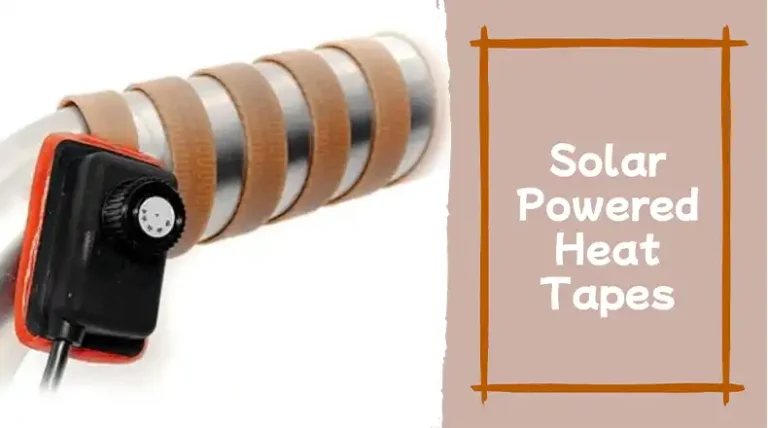Why is SunPower So Expensive | General Discussion
Investing in solar energy is a smart move for homeowners who are looking to reduce their carbon footprint and save on electricity bills. However, the upfront cost of solar panels can be a significant barrier, especially when considering premium brands like SunPower. Many people often wonder why SunPower panels are so expensive compared to other options in the market.
The short answer is that SunPower’s high price tag is primarily due to their use of superior technology and materials that make those solar panels highly efficient and durable. But the question remains: is the extra cost worth it?
In this guide, I’ll explain the intricate details that make SunPower panels stand out from the crowd. I’ll also help you explore the cutting-edge technology behind their panels, the benefits they offer, and whether the investment truly pays off in the long run. So, get ready to discover the mystery behind SunPower’s premium pricing!
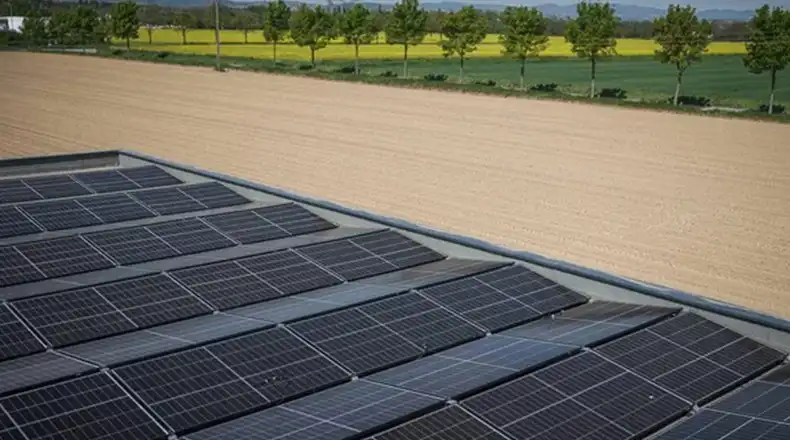
The Technology Behind SunPower’s High Efficiency and High Price
SunPower’s panels are widely regarded as some of the most efficient and highest-performing solar panels on the market. Their exceptional energy conversion rates, long lifespan, and industry-leading warranties, making them a premium choice for those seeking a reliable and long-term solar solution.
This exceptional efficiency is achieved through their proprietary Maxeon solar cell technology, which is built on a foundation of innovative engineering and advanced materials.
Maxeon Solar Cells
SunPower offers two main product lines built around the Maxeon technology: the Performance series with panel efficiencies of up to 21.1%, and the flagship Maxeon series that boasts exceptional efficiencies of up to 23%. The latter is widely regarded as one of the most efficient solar panel options available on the market.
At the heart of SunPower’s solar panels lies their signature Maxeon solar cells. These cells are constructed using a unique copper-based design, which allows for better conductivity and lower resistance compared to traditional silicon-based cells. This innovative approach results in higher energy conversion rates, enabling the panels to generate more electricity from the same amount of sunlight.
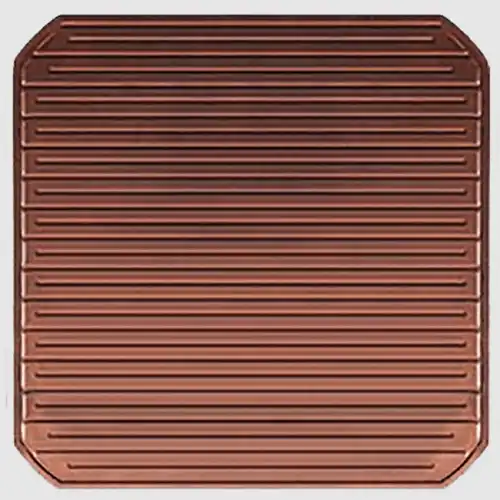
Additionally, the Maxeon cells are designed with a solid copper foundation and a thin silicon layer on top. This unique structure enhances the cells’ ability to capture and convert sunlight into electricity, further boosting their efficiency. Recognized as a solar industry pioneer, SunPower’s commitment to innovation is evident in its extensive portfolio of over 1,000 patents related to solar technology.
Advanced Cell Architecture
SunPower’s Maxeon cells are also notable for their advanced cell architecture. Unlike conventional solar cells, which have a flat surface, Maxeon cells feature a unique pyramid-like structure. This innovative design allows the cells to capture sunlight from various angles, maximizing energy production throughout the day and in different weather conditions.
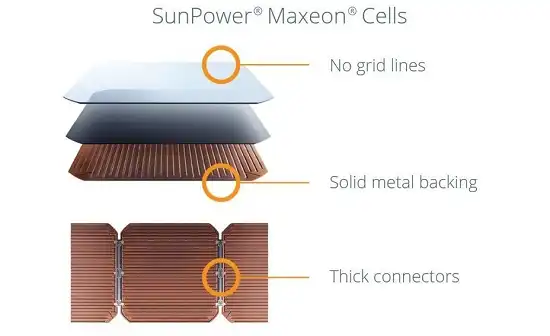
Furthermore, the cells are coated with an anti-reflective layer, which minimizes light reflection and ensures that more sunlight is absorbed, further increasing the panels’ overall efficiency.
High-Quality Materials
In addition to their cutting-edge cell technology, SunPower’s panels are constructed using premium materials that contribute to their durability and long-lasting performance. The panels feature a robust aluminum frame and a thick, tempered glass cover that protects the cells from environmental factors such as wind, hail, and extreme temperatures.
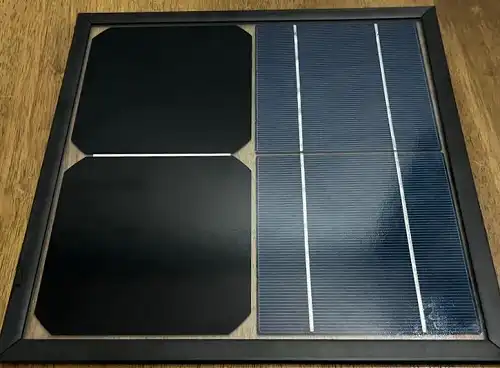
SunPower also employs a specialized encapsulation material that effectively insulates the solar cells, protecting them from moisture, UV radiation, and thermal cycling. This attention to detail ensures that the panels maintain their high efficiency and performance over an extended lifespan.
Advantages of Investing in SunPower Solar Panels
While the initial investment in SunPower solar panels may be higher than some other brands, the long-term benefits and advantages they offer can make them a worthwhile investment for many homeowners and businesses.
1. Superior Energy Production
One of the primary advantages of SunPower’s panels is their exceptional energy production capability. Thanks to their high-efficiency Maxeon cells and advanced cell architecture, SunPower panels can generate significantly more electricity compared to conventional solar panels of the same size.
This increased energy production translates into greater savings on electricity bills over the lifetime of the system, potentially offsetting the higher upfront cost in the long run.
2. Industry-Leading Warranty
SunPower offers an industry-leading 25-year combined product and power warranty on their solar panels. This comprehensive warranty not only covers manufacturing defects but also guarantees a specific level of power output over the warranty period.
Specifically, SunPower guarantees that their panels will maintain at least 92% of their rated power output after 25 years of operation. This impressive warranty offers homeowners peace of mind and protects their investment, ensuring reliable performance for decades to come.
3. Aesthetic Appeal
In addition to their exceptional performance, SunPower’s solar panels are designed with aesthetics in mind. The sleek and modern appearance of their panels can enhance the curb appeal of a home or business, making them an attractive addition to any property.
SunPower offers a variety of panel colors and designs, allowing homeowners to choose the option that best complements the style and architecture of their building.
4. Environmental Sustainability
By investing in SunPower’s highly efficient solar panels, homeowners and businesses can significantly reduce their carbon footprint and contribute to a more sustainable future. SunPower’s panels are manufactured using environmentally-friendly processes, and their high energy production helps offset the reliance on fossil fuels for electricity generation.
Additionally, SunPower’s commitment to sustainability extends beyond their products. The company has implemented various initiatives to minimize waste, conserve resources, and promote renewable energy throughout their operations.
Cost Comparison and Return on Investment
While SunPower’s solar panels may have a higher upfront cost compared to some other brands, it’s important to consider the long-term savings and return on investment (ROI) they can provide.
Initial Cost Breakdown
The initial cost of a SunPower solar system can vary depending on factors such as system size, installation location, and any applicable incentives or rebates. However, as a general guideline, SunPower’s panels typically cost between $3.00 and $4.50 per watt, which is higher than the industry average of around $2.50 to $3.50 per watt.
For example, a 6-kilowatt SunPower solar system could cost anywhere from $18,000 to $24,000, before incentives and rebates.
Here are the costs of SunPower’s systems based on common residential sizes:
| System Size | Installation Cost |
| 5 kW | $15,000–$22,500 |
| 6 kW | $18,000–$27,000 |
| 7 kW | $21,000–$31,500 |
| 8 kW | $24,000–$36,000 |
Long-Term Savings
Despite the higher upfront cost, SunPower’s panels can provide substantial long-term savings due to their superior energy production and efficiency. Over the lifetime of the system, which can span 25 years or more, the increased energy output can offset the initial investment and result in significant savings on electricity bills.
According to SunPower’s estimates, a typical residential solar system can save homeowners tens of thousands of dollars on electricity costs over its lifespan, depending on factors such as location, electricity rates, and system size.
Here is the list of warranties provided by SunPower compared to other industries:
| Warranty Type | SunPower Length | Industry Average |
| Workmanship or service warranty | 25 years | 18 years |
| Product warranty | 25–40 years | 24 years |
| Performance warranty | 25 years | 24 years |
Return on Investment (ROI)
When considering the long-term savings and the various incentives and rebates available for solar installations, SunPower’s panels can offer an attractive return on investment (ROI).

Many homeowners and businesses can expect to recoup their initial investment within 7 to 12 years, after which the system essentially generates free electricity for the remainder of its lifespan.
Additionally, the increased property value associated with a high-quality solar installation can further enhance the ROI when it comes time to sell the property.
Bonus Tips: Factors to Consider When Choosing SunPower
While SunPower’s solar panels offer numerous advantages, it’s essential to carefully evaluate your specific needs and circumstances before making an investment decision.
- Energy Needs and Consumption
When considering SunPower’s panels, it’s crucial to assess your energy needs and consumption patterns. If your household or business has relatively low energy demands, the higher upfront cost of SunPower’s panels may not be justified.
However, if you have higher energy consumption or live in an area with high electricity rates, the long-term savings from SunPower’s efficient panels could make them a more cost-effective choice.
- Available Roof Space and Orientation
The amount of available roof space and its orientation can also play a significant role in determining the suitability of SunPower’s panels. SunPower’s panels are designed to maximize energy production, even in less-than-ideal conditions.
If your roof has limited space or an unfavorable orientation, SunPower’s high-efficiency panels could be a better option to ensure you generate sufficient energy to meet your needs.
- Local Incentives and Rebates
When evaluating the cost-effectiveness of SunPower’s solar panels, it’s essential to consider any local incentives or rebates that may be available in your area. Many states and municipalities offer tax credits, rebates, or other financial incentives to encourage the adoption of solar energy.
These incentives can significantly reduce the upfront cost of a SunPower system, making the investment more financially viable.
- Long-Term Plans and Goals
Finally, it’s important to consider your long-term plans and goals when choosing a solar panel system. If you plan to stay in your current home or business location for an extended period, investing in SunPower’s premium panels with their industry-leading warranty and long lifespan could be a wise decision.
However, if you are going to move or relocate within a shorter time frame, a more budget-friendly option may be more suitable for you; as the upfront cost of SunPower’s panels may not be fully recouped before you move.
Summing Up
SunPower’s premium pricing is a reflection of the company’s commitment to delivering cutting-edge technology, superior efficiency, and unparalleled quality. While the upfront cost may be higher than some other solar panel brands, the long-term benefits and savings offered by SunPower’s panels can make them a worthwhile investment for many homeowners and businesses. If you have any further questions or need additional guidance on whether SunPower’s solar panels are the right choice for your specific needs, feel free to leave a comment below. I’ll be more than happy to assist you in making an informed decision. Thank you for taking the time to read this comprehensive guide, and we wish you the best in your journey towards harnessing the power of the sun!
Related Queries
Is The Higher Cost Of SunPower Panels Worth It?
While the upfront cost is higher, SunPower’s panels can provide substantial long-term savings through increased energy production, lower electricity bills, and attractive return on investment, making them a worthwhile investment for many homeowners and businesses.
Can SunPower Panels Increase Home Value?
Yes, installing high-quality solar panels like those from SunPower can potentially increase the value of your home, as they are seen as a desirable and environmentally-friendly feature by many homebuyers.
Are SunPower Panels Eligible For Tax Credits Or Rebates?
Yes, SunPower solar panel installations may qualify for various tax credits, rebates, and other financial incentives depending on your location and local or state policies aimed at promoting renewable energy adoption

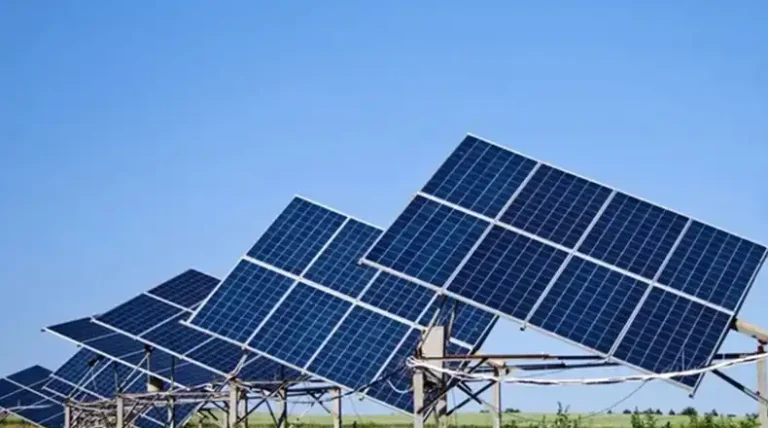
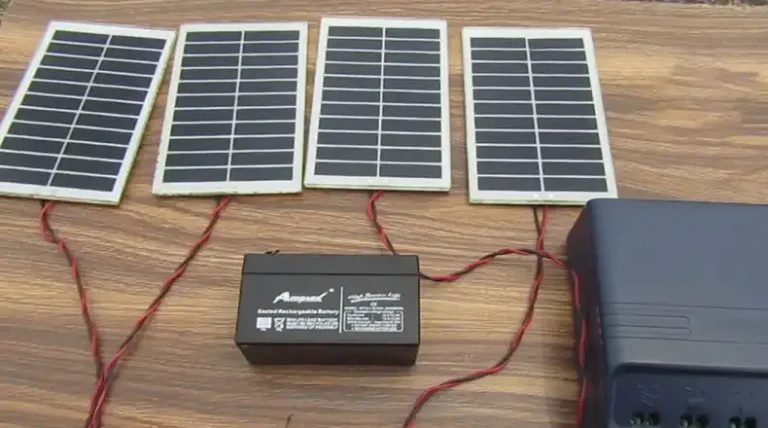

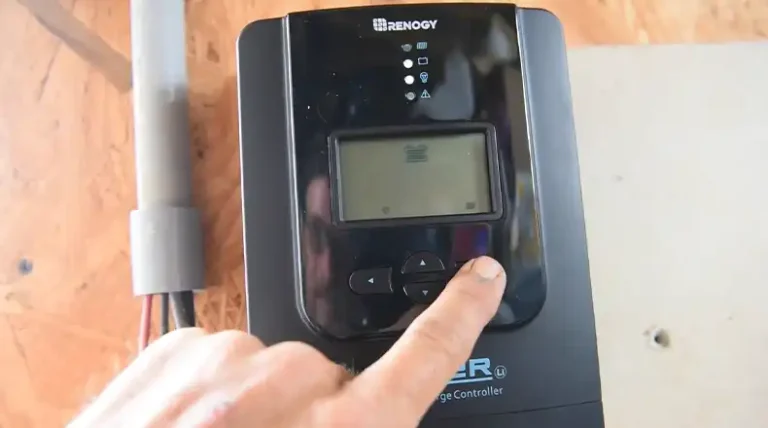
![[Troubleshooting] Solar Charge Controller No Load Output](https://www.itekenergy.com/wp-content/uploads/2023/12/Solar-Charge-Controller-No-Load-Output-768x428.webp)
